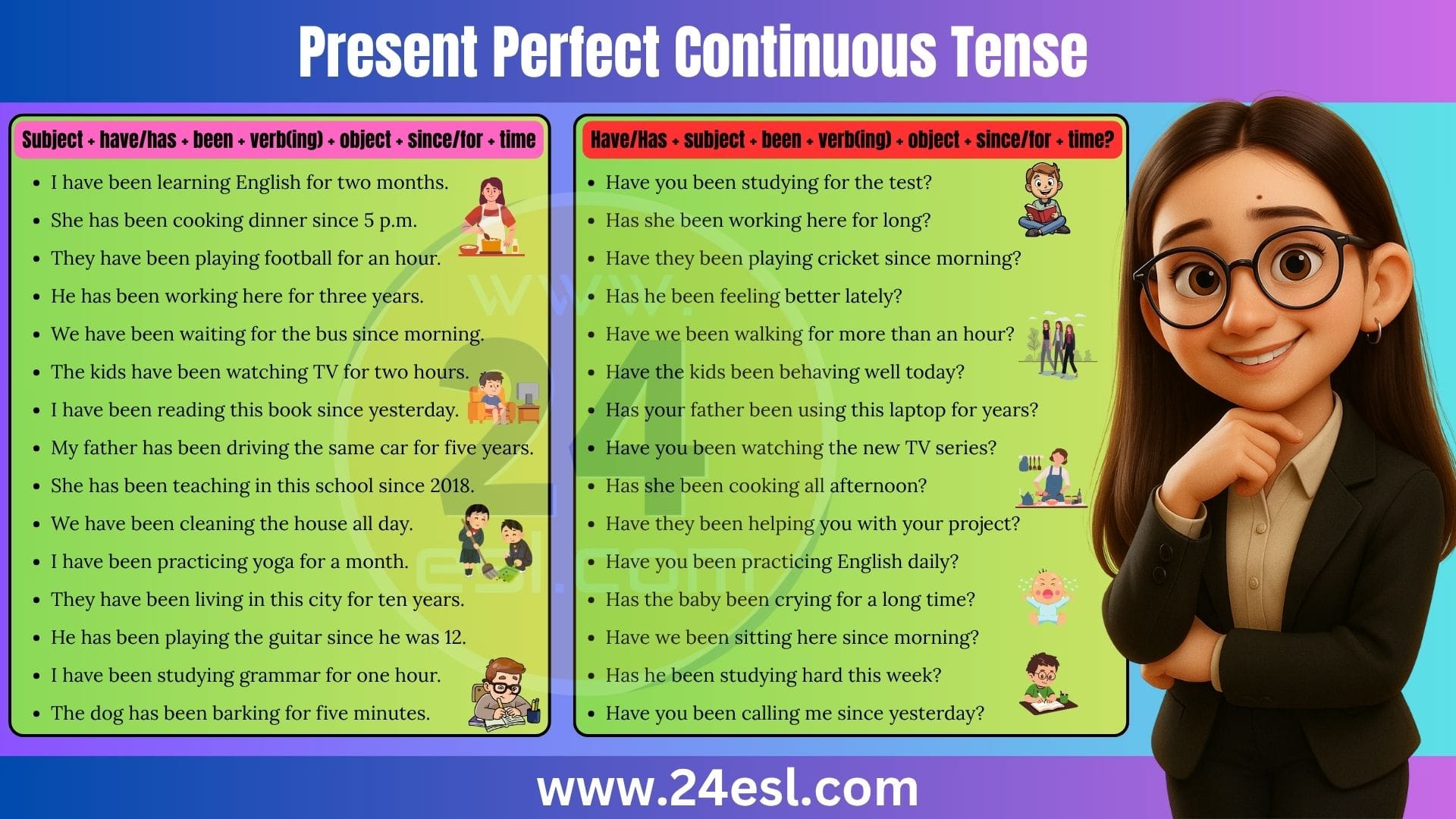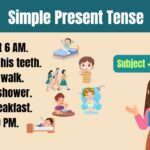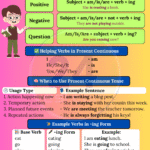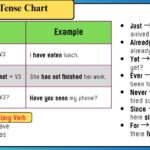Introduction
The Present Perfect Continuous Tense is one of the most useful tenses in English for talking about actions that started in the past and are still continuing in the present. It helps you express both the activity and the time duration, which is very important in daily conversations.
For example, if you say, “I have been learning English for three months,” it clearly tells the listener when you started and that you are still learning now. This tense is especially important in spoken English because it makes your sentences sound more natural and complete. Whether you’re speaking in a meeting, chatting with friends, or writing emails, mastering the Present Perfect Continuous Tense will help you communicate more clearly and confidently.
What is Present Perfect Continuous Tense?
The Present Perfect Continuous Tense is used to talk about an action that began in the past and is still continuing in the present. It focuses on both the activity and how long it has been happening. This tense is often used with time expressions like since and for to show the duration.
Example: I have been learning English for two months.
Here, the sentence tells us two things:
The action (learning English) started two months ago.
The action is still happening right now.
In simple words, the Present Perfect Continuous Tense connects the past to the present by showing that the activity hasn’t finished yet.
Structure / Formula
To use the Present Perfect Continuous Tense correctly, you need to follow a simple structure. It changes slightly depending on whether the sentence is positive, negative, or a question.
Affirmative (Positive) Sentence Formula
Subject + have/has + been + verb(ing) + object + since/for + time
Example: She has been working here for five years.
Negative Sentence Formula
Subject + have/has + not + been + verb(ing) + object + since/for + time
Example: I have not been feeling well since yesterday.
Interrogative (Question) Sentence Formula
Have/Has + subject + been + verb(ing) + object + since/for + time?
Example: Have you been studying English for a long time?
💡 Tip for Learners: When practicing grammar, writing it down and reading it aloud helps you remember faster. A Whiteboard for Practice can be a great tool for writing formulas and examples daily. It’s reusable, easy to clean, and perfect for visual learners.
Also, if you like learning while listening, using Noise-Cancelling Headphones can help you focus on English audio lessons without distractions. This is especially helpful if you practice listening exercises or watch English learning videos.
You can also read this:
Usage of Present Perfect Continuous Tense
The Present Perfect Continuous Tense is mainly used in three situations. Understanding these will help you use it naturally in both spoken and written English.
- Action started in the past and is still continuing
Example: I have been reading this book since morning.
This tells us the reading started earlier and is still happening now.
- Emphasizing the duration of an action
Example: They have been waiting for over an hour.
Here, the focus is on how long the waiting has been going on.
- Talking about temporary or repeated actions
Example: She has been visiting her grandmother every weekend this month.
This shows a repeated action that has been happening recently.
💡 Learning Tip: When you practice speaking, focus on sentences that talk about “how long” or “since when” something has been happening. This helps you get comfortable with using since and for correctly.
To improve faster, you can keep a daily speaking journal. Write 3–5 sentences every day using this tense. If you want to make writing more enjoyable, try a Smart Notebook (Reusable) — it lets you write, erase, and reuse pages, making grammar practice both eco-friendly and fun.
For listening practice, a Bluetooth Speaker (Portable) is great for playing English podcasts or lessons clearly, even while you’re doing other activities.
Time Expressions Used in Present Perfect Continuous Tense
When using the Present Perfect Continuous Tense, certain time expressions make your sentences clearer and more accurate. These words help the listener understand how long the action has been happening.
Common Time Expressions
- Since – used with a specific starting point in time.
Example: I have been working here since 2021. - For – used with a period of time.
Example: She has been studying for three hours. - All day / All morning / All week – to show the entire time frame.
Example: We have been cleaning all morning. - How long – to ask about the duration of an action.
Example: How long have you been learning English?
💡 Tip for Practice: Write down 10 sentences using each of these time expressions. This will help you naturally remember when to use since and when to use for.
You can make this practice even easier by using Sticky Notes for Vocabulary Practice. Write the time expressions on them and stick them near your study area as a reminder.
Also, if you like interactive learning, a Smart Speaker (Alexa) can be a fun way to practice English. You can ask it questions like, “Alexa, give me an example sentence in Present Perfect Continuous Tense,” and get instant responses.
Examples Table – Present Perfect Continuous Tense
Here’s a simple table with positive, negative, and question forms so you can clearly see how the Present Perfect Continuous Tense works in real sentences.
Type | Example Sentence |
Affirmative | I have been learning English for two years. |
Affirmative | She has been working at the same company since 2018. |
Negative | We have not been sleeping well for the past few days. |
Negative | He has not been feeling healthy since last week. |
Question | Have you been practicing English every day? |
Question | Has she been reading that book for a long time? |
💡 Practice Idea: Read these sentences aloud and try replacing the subject or time expressions to make your own examples. This will help you remember the structure without having to memorize rules mechanically.
To make your practice more effective, consider using a Book Holder for Reading while studying grammar books — it keeps your hands free for note-taking. And if you’re listening to examples or pronunciation, Headphones with Mic can make the sound clearer and allow you to practice speaking aloud without disturbing others.
Common Mistakes to Avoid in Present Perfect Continuous Tense
Even though the Present Perfect Continuous Tense is simple once you understand it, many learners make small mistakes that can change the meaning of their sentences. Here are the most common ones to watch out for:
Forgetting “been” in the sentence
❌ Wrong: I have learning English for two months.
✅ Correct: I have been learning English for two months.
Mixing with Present Perfect Tense
The Present Perfect Tense focuses on the result, while Present Perfect Continuous focuses on the duration.
Example:
- Present Perfect: I have finished my homework. (Result)
- Present Perfect Continuous: I have been doing my homework for two hours. (Duration)
Using “since” and “for” incorrectly
- Since is for a specific starting point: since 2019, since Monday, since morning
- For is for a length of time: for 2 hours, for 5 days, for a month
💡 Learning Tip: Keep a mini grammar reference at your desk so you can quickly check sentence structures. The Wren & Martin English Grammar Book is a classic and trusted choice for learners who want both explanations and exercises.
Also, recording yourself speaking is a powerful way to catch mistakes. A Voice Recorder Device can help you track your progress and notice where you might be going wrong.
Practice Exercises – Present Perfect Continuous Tense
Practicing regularly is the best way to master the Present Perfect Continuous Tense. Here are some simple exercises you can try right now.
Fill in the blanks with the correct form
- She __________ (study) for three hours.
- We __________ (wait) for the bus since 8 a.m.
- They __________ (not sleep) well for the past week.
- __________ you __________ (work) on your project lately?
Correct the mistakes
- I have been learn English for two years.
- He has playing football since morning.
- Have you been listened to the audio lesson?
Make Your Own Sentences
- Write 5 sentences about what you have been doing recently.
- Try using since in three sentences and for in the other two.
💡 Pro Tip for Learners: Writing is good, but speaking your answers out loud makes practice even more effective. Use a Microphone for PC/Mobile for clear voice recording during practice sessions — it can help you hear your pronunciation and grammar in real-time.
And if you want to make grammar study more organized, a Desk Organizer for Study Table is great for keeping books, notebooks, and stationery in one place, so you’re always ready to learn without wasting time searching for materials.
Helpful Tools for Learning Present Perfect Continuous Tense
Learning grammar is much easier when you have the right tools. These aren’t just random items — they can genuinely make your study sessions more productive, comfortable, and even fun. Here are some highly recommended resources for mastering the Present Perfect Continuous Tense and English in general:
English Conversation Practice Book
If you want ready-made dialogues and examples to understand sentence flow, the English Conversation Practice Book is a great choice. It includes real-life situations where you can see this tense in action.
Smart Notebook (Reusable)
Instead of wasting paper on grammar exercises, use a Smart Notebook (Reusable). You can write your sentences, wipe them clean, and reuse them — perfect for daily practice.
Noise-Cancelling Headphones
For listening practice, Noise-Cancelling Headphones help block distractions so you can focus on English lessons, podcasts, or YouTube grammar tutorials.
Whiteboard for Practice
A Whiteboard is a simple yet powerful tool for writing formulas, making quick notes, and practicing example sentences visually.
💡 Why These Tools Matter:
Many learners struggle not because grammar is hard, but because their study environment isn’t set up for success. Having a few practical learning tools can make studying more consistent, engaging, and effective.
Conclusion
The Present Perfect Continuous Tense is a powerful way to describe actions that began in the past and are still happening now. By learning its structure, common time expressions, and proper usage, you can make your English sound more natural and fluent.
Remember — practice is the key. Write your own sentences, speak them out loud, and listen to examples every day. Over time, you’ll start using this tense automatically in your conversations.
To make your learning journey smoother, keep a Wren & Martin English Grammar Book for quick reference and use a Voice Recorder Device to track your speaking progress. These simple tools can help you turn grammar rules into confident, real-life communication skills.
So, start today — because the more you use the Present Perfect Continuous Tense, the more natural it will feel. You have been learning, now keep going!
A. Affirmative Sentences (Present Perfect Continuous Tense)
I have been learning English for two months.
She has been cooking dinner since 5 p.m.
They have been playing football for an hour.
He has been working here for three years.
We have been waiting for the bus since morning.
The kids have been watching TV for two hours.
I have been reading this book since yesterday.
My father has been driving the same car for five years.
She has been teaching in this school since 2018.
We have been cleaning the house all day.
I have been practicing yoga for a month.
They have been living in this city for ten years.
He has been playing the guitar since he was 12.
I have been studying grammar for one hour.
The dog has been barking for five minutes.
She has been working on her project all week.
We have been talking on the phone for 30 minutes.
He has been learning how to cook for three weeks.
The students have been doing their homework since morning.
I have been feeling tired since last night.
B. Negative Sentences (Present Perfect Continuous Tense)
- I have not been sleeping well for the past few days.
- She has not been studying regularly this month.
- They have not been coming to class on time.
- He has not been exercising for the last two weeks.
- We have not been watching TV since Monday.
- The kids have not been eating vegetables lately.
- I have not been drinking enough water these days.
- My brother has not been helping me with chores.
- She has not been speaking to me since the argument.
- They have not been visiting their grandparents lately.
- I have not been using my phone much this week.
- He has not been feeling well since yesterday.
- We have not been meeting regularly for coffee.
- She has not been paying attention in class.
- The baby has not been sleeping at night.
- I have not been working on my homework today.
- They have not been following the teacher’s instructions.
- He has not been reading the newspaper lately.
- We have not been going to the gym for a month.
- She has not been smiling much these days.
C. Questions (Present Perfect Continuous Tense)
- Have you been studying for the test?
- Has she been working here for long?
- Have they been playing cricket since morning?
- Has he been feeling better lately?
- Have we been walking for more than an hour?
- Have the kids been behaving well today?
- Has your father been using this laptop for years?
- Have you been watching the new TV series?
- Has she been cooking all afternoon?
- Have they been helping you with your project?
- Have you been practicing English daily?
- Has the baby been crying for a long time?
- Have we been sitting here since morning?
- Has he been studying hard this week?
- Have you been calling me since yesterday?
- Has she been listening to music for hours?
- Have they been living in this house for long?
- Have you been waiting for me here?
- Has your brother been learning to swim?
- Have we been talking for over an hour?
Extra Everyday Life Examples (Mix of Forms)
I have been cooking breakfast since 7 a.m.
She has not been sleeping well this week.
Have you been reading this book for long?
We have been waiting for a taxi for 20 minutes.
He has not been coming to the office regularly.
Have they been visiting you often?
I have been practicing my presentation since yesterday.
The students have not been concentrating in class.
Has she been using this phone for years?
We have been decorating the house all day.
I have not been going to the gym lately.
Have you been drinking enough water?
He has been teaching English since 2015.
They have not been talking to each other.
Have you been feeling okay?
She has been working from home for two weeks.
I have not been wearing my watch recently.
Have they been attending the meeting since morning?
We have been learning new vocabulary this week.
He has not been replying to my messages.
More Practice Sentences
- I have been listening to English podcasts for three months.
- She has not been checking her email regularly.
- Have you been trying to fix the computer?
- They have been repairing the road for a week.
- We have not been eating outside recently.
- Has he been watching too much TV?
- I have been working on my blog since last night.
- She has not been joining our study group.
- Have you been learning grammar rules?
- They have been planning a trip for months.
- I have not been studying for the exam.
- Have we been walking in the right direction?
- He has been using this pen for years.
- She has not been feeling well since Monday.
- Have you been cleaning the room all morning?
- We have been discussing the project since lunch.
- I have not been making enough time for reading.
- Have they been playing video games for hours?
- He has been traveling for work all month.
- She has not been wearing her glasses lately.
Affiliate Disclosure
This post contains affiliate links. As an Amazon Associate, I earn from qualifying purchases at no additional cost to you. I only recommend products that I personally find helpful for learning and improving English.



